牛津译林版英语8B-Unit5-Good-manners-知识归纳与拓展教学教材
最新牛津译林版八年级英语下册 8B Unit5 Good manners Integrated skills精品课件

最新初中英语精品课件设计
3. 她太害羞而不能参加讨论。 Sheis too shy to join the
______d_is_c_u_s_s_io_n______________. 4. Amy的is唱to歌o课bu太sy忙w而ith没h看er电si视ng。ing
Unit 5 Good manners
最新初中英语精品课件设计
最新初中英语精品课件设计
Translation.
1. 当别人讲话时,这个小男孩有足够的耐 心仔细听吗? _I_s__ the little boy ___p_a_ti_en__t _e_n_o__ug_h__ to
_l_is_t_e_n_ _c_a_r_e_fu__lly_ when __o_th__e_rs______. 2. 她sp从ea不k慷慨地和他人分享东西。
最新初中英语精品课件设计
1. Amy is talking with her cousin Shirley about sighs used in public places. public adj. 公共的,公开的 e.g. The town has its own public library and public gardens. 那城市有自己的公用图书馆和公 园。
Alemssyo_n_s_t_o_w_a_t_c_h_T_V_______________ _________________________. 5. 不要太b激e t动oo而e不xc能ite表d 达to 清ex楚pr自es己s 。 Don’t yourself ______a_r_e_n_e_v_e_r_t_o_o_o_l_d_t_o_______. 6. 活到老lea学rn到最老新初。中英语精品课件设计
译林版牛津英语8B全册八单元知识点整理及单元测试卷:8 B Unit 5 Good manners

Unit 5 Good manners内容全解Part One Comic strip重点全解1、You’re old enough to learn about manners now, Hobo. (P 64)(1)manner 可数名词,此处意为“礼貌,礼仪,礼节”,常用复数形式。
常用搭配:good manners 有礼貌bad manners 没礼貌table manners 餐桌礼仪(2) manner 作可数名词,还有“方法,方式”之意,常用单数形式,与way同义。
例如:You should write in this manner.2、First, always share your things with others.(P 64)share sth with sb 意为“和某人分享、合用某物”。
例如:Let’s share the birthday cake with them.3、Second, don’t cut in on others. (P 64)cut in (on sb.) 意为“打断某人的谈话,插嘴”,相当于interrupt sb。
例如:Mary likes to cut in on others.4、Always wait politely. (P 64)(1) politely 副词,意为“礼貌地”,常用来修饰动词。
例如:We should speak to the old politely.(2) polite 形容词,意为“礼貌的”,可用作定语、表语等,它的反义词impolite,意为“无礼的”。
be polite to sb. 意为“对某人有礼貌”。
例如:It’s impolite to shout loudly.The students are polite to their teachers.Part Two Welcome to the unit重点全解1、Leave the tap running.(P 65)(1) leave sth doing意为“使/让.......处于.....状态”。
Unit5Goodmanners_task知识点讲义-牛津译林版英语八年级下册

【Task~Selfassessment】重点单词1.purpose n.目的purposeful adj.有目的的;坚毅的purposefully adv.果断地,有明确目的地purposely adv.故意地,蓄意地2.* content n.内容;目录3.* conclusion n.总结,归纳4.guest n.客人,宾客5. * host n.主人;主持6.impolite adj.不礼貌的反义词polite adj.礼貌的impolitely adv.无礼地;没规矩地impoliteness n.无礼,失礼politely adv.礼貌地(比较级)more politely (最高级)most politely polite adj.礼貌的(反义词)impolite◆adj.不礼貌的【Task~Selfassessment】重点短语1.give a talk on sth. 做一个关于……的报告2.good table manners 良好的餐桌礼仪3.the purpose of the talk 演讲的目的4.the purpose of... .....的目的5.start doing sth. 开始做某事6.make too much noise 制造太多噪音;发出太多的噪音7. make too much noise while eating or drinking 吃喝时弄出太多声音8.eat with your mouth open 张着你的嘴巴吃9.don't talk with food in your mouth 嘴里有食物时别讲话10.talk with food in one's mouth 嘴里含着食物说话11.reach over sb. 's plate for sth. 越过某人的盘子取东西12.wait for everyone to finish 等待每个人结束13.make sure 确信,确保14.both guests and hosts... 宾客和主人都.....15.remember to do sth. 记得要去做某事16.hold a talk on good table manners 举办一个有关良好餐桌礼仪的讲座17.teach students rules for eating 教学生们吃饭的规矩18.take place 发生;举行19.a lot of rules on... 许多关于......的规则20. a lot of advice on table manners 很多关于餐桌礼仪的建议21.above all 首要的是;首先22.sit at the table 坐在桌子旁23. a lot of advice on table manners 很多关于餐桌礼仪的建议【Task~Selfassessment】重点句型1. Do not eat with your mouth open. 吃饭的时候不要张着嘴。
最新8B-Unit5-Good-manners知识点讲解
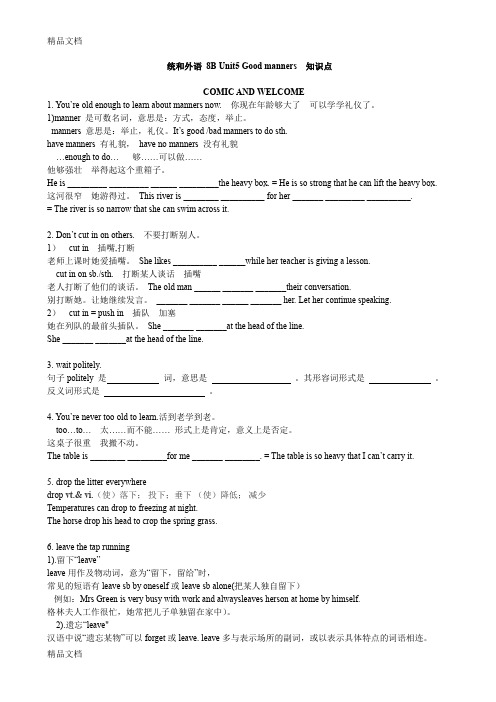
统和外语8B Unit5 Good manners知识点COMIC AND WELCOME1. You’re old enough to learn about manners now. 你现在年龄够大了可以学学礼仪了。
1)manner 是可数名词,意思是:方式,态度,举止。
manners 意思是:举止,礼仪。
It’s good /bad manners to do sth.have manners 有礼貌,have no manners 没有礼貌…enough to do… 够……可以做……他够强壮举得起这个重箱子。
He is _________ _________ ______ _________the heavy box. = He is so strong that he can lift the heavy box. 这河很窄她游得过。
This river is ________ __________ for her _______ _________ __________.= The river is so narrow that she can swim across it.2. Don’t cut in on others. 不要打断别人。
1)cut in 插嘴,打断老师上课时她爱插嘴。
She likes __________ ______while her teacher is giving a lesson.cut in on sb./sth. 打断某人谈话插嘴老人打断了他们的谈话。
The old man ______ _______ _______their conversation.别打断她。
让她继续发言。
_______ _______ ______ _______ her. Let her continue speaking.2)cut in = push in 插队加塞她在列队的最前头插队。
牛津译林版八年级英语下册8BUnit5Goodmanners教案(表格式)

牛津译林版八年级英语下册8BUnit5Goodmanners教案(表格式)课题8B Unit 5 Good mannersWelcome to the unit & comic strip课时 1 授课日期教学目标To know about the good manners in public.To talk about how to behave politely in public.To get students to develop the habit of good manners.教学重难点T o know about the good manners in public. (Importance) To talk about how to behave politely in public. (Importance) To talk about how to behave politely in public. (Difficulty)预习要求To think about how to behave politely in public.教学内容及活动设计二次复备及教学随感Step 1 CheckingLet the students try to read the new wordsStep 2 Lead –in1.Free talkDo you want to be good citizens(公民)? How can you be good citizens?2. Show some pictures and ask if they are doing the right thingsStep 3 LearningLet the Ss look at the pictures in Part A on Page 65 and teach some phrasesStep 4 Practising1.Finish Part A on Page 652.Let the students answer some questions about the picturesStep 5 Lead-inAsk: What should we do and shouldn’t we do in the library?Step 6 LearningListen to the conversation on Page 65 and fill in the formIn the libraryWe should ______ ___________ the library ______ _____ _____ the books after readingWe shouldn’t chat or _____ in th e library _____ _____ everywhere _____ in the books1。
译林牛津版8B Unit 5 Good manners Integtrated skills 教学课件 (共21张PPT)

Unit5 Good manners
Integrated skills
Subject:English Editor: Tao Hong
LOLOGOGO
Learning aims
1.听录音获取有效信息完成记录表。‘ 2.认识常见的公共标志。 3.遵守公共规则,做文明公民。
LOGO
New words
LOGO
This sign warns us not to swim here.
v.警告,告诫
LOGO
They are public signs .
adj.公共的,公开的
LOGO
ቤተ መጻሕፍቲ ባይዱ
New words
public
adj.公共的,公开的
explain
v.解释
warn
v.警告,告诫
parking
n.停车
Sign
Meaning Usually seen
No smoking in __p_l_a_c_e_s__li_k_e_ hospitals
No photos in __p_l_a_c_e_s__li_k_e_ museums
No parking No littering
in ___t_h_e__s_t_r_e_e_t
6. I _d_id_n_'_t_(not) notice that sign just now.
牛津译林版八年级英语下册8BUnit5GoodmannersIntegratedskills教学设计
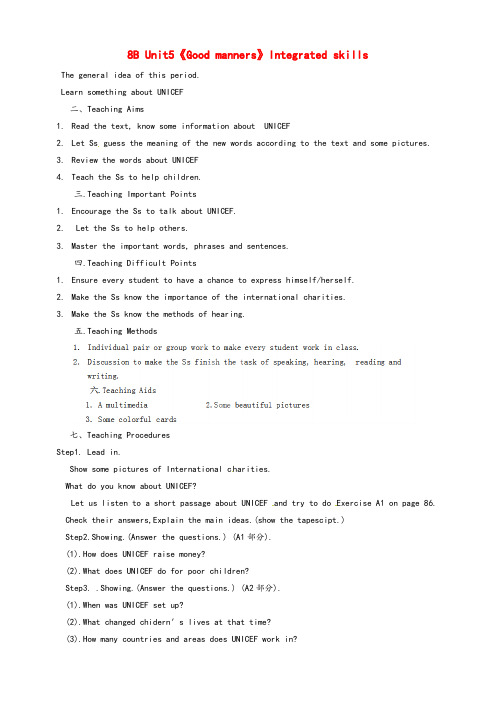
8B Unit5《Good manners》Integrated skillsThe general idea of this period.Learn something about UNICEF二、Teaching Aims1.Read the text, know some information about UNICEF2.Let Ss guess the meaning of the new words according to the text and some pictures.3.Review the words about UNICEF4.Teach the Ss to help children.三.Teaching Important Points1.Encourage the Ss to talk about UNICEF.2. Let the Ss to help others.3.Master the important words, phrases and sentences.四.Teaching Difficult Points1.Ensure every student to have a chance to express himself/herself.2.Make the Ss know the importance of the international charities.3.Make the Ss know the methods of hearing.五.Teaching Methods七、Teaching ProceduresStep1. Lead in.Show some pictures of International c harities.What do you know about UNICEF?Let us listen to a short passage about UNICEF and try to do Exercise A1 on page 86.Check their answers,Explain the main ideas.(show the tapescipt.)Step2.Showing.(Answer the questions.) (A1部分).(1).How does UNICEF raise money?(2).What does UNICEF do for poor children?Step3. .Showing.(Answer the questions.) (A2部分).(1).When was UNICEF set up?(2).What changed chide rn′s lives at that time?(3).How many countries and areas does UNICEF work in?Check the answers.Step4 Reading and acting out the text.Sample conversationS1: I used to spnd all my pocket money on CDs and clothes.S2: Me too. I used to go shopping almost every day.Now I try to save some money to give to charity.S1: Wha t′s your favourite charity?S2: ORBIS,because they teach doctors and nurses all over the world how to cure blindness.I think it would be terrible to be blind.And you?S1: I sometimes donate money to friends of the earth because they work very hard to protect our environment.S2: I read about the work they do to save the wor ld′s rainforests. I agree that it is very important to protect the natural areas where animal live.Step5 Homework.(1).Write a dialogue. (87页B部分).(2).Complete the exercise .(Listening补充习题).。
(完整版)8BUnit5Goodmanners知识点讲解

统和外语 8B Un it5 Good mann ers 知识点COMIC AND WELCOME1. You ' re old enough to learn about manners now 你现在年龄够大了 可以学学礼仪了。
1)manner 是可数名词,意思是:方式,态度,举止。
manners 意思是:举止,礼仪。
It ' s good /bad manners to do sth. have manners 有礼貌, have no manners 没有礼貌 •••e no ugh to do … 够 .... 可以做 .... 他够强壮举得起这个重箱子。
He is __________________________________ t he heavy box. = He is so strong that he can lift the heavy box. 这河很窄 她游得过。
This river is __________________ for her ___________________________ . =The river is so n arrow that she can swim across it. 2. Don ' t cut in on others.不要打断别人。
1) cut in 插嘴,打断 老师上课时她爱插嘴。
She likes ________________ while her teacher is givi ng a lesso n.cut in on sb./sth.打断某人谈话 插嘴老人打断了他们的谈话。
The old man ____________________ their con versati on.另U 打断她。
让她继续发言。
_________________________________ her. Let her continue speak ing. 2) cut in = push in 插队 加塞 她在列队的最前头插队。
牛津译林英语8B Unit5 Good manners 知识点

牛津译林英语8B Unit5 Good manners一、重要词汇和短语1. politely adv.礼貌地eg. We should speak to the old people politely. 我们应该跟老年人礼貌交谈。
polite ---- impolite 不礼貌的eg. It is impolite to laugh at others. 嘲笑别人是不礼貌的。
2. litter n.垃圾(不可数)近义词n. rubbish (不可数)eg. Don’t throw litter/rubbish everywhere.不要到处乱扔垃圾。
There is a public sign saying “No Littering”.这儿有句公共标语—禁止乱扔垃圾。
3. run v.流动;跑;(车辆、机器)开动,运转run--- ran --- runeg. Don’t leave the tap running . 不要让水一直都流淌着。
(现在分词做宾语补足语,表示主动和正在进行)The machine ran very well. 机器运转非常正常。
4. pick v. 采摘,挑选,拾取pick flowers in the park①pick out 1. 挑选出;拣出Eg. Let me pick out some good apples for you.2. 辨认出Eg. It's easy to pick him out in a crowd because he is very tall.②pick up 1. 拾起Eg. The boy picked up the hat for the old man.2. 收拾Eg. You should pick up the tools after work.3. 学到;获得Eg. He was picking up the skills quickly.4. 与...偶然结识(常指与异性调情)Eg. We picked up a couple of girls at the pub last Friday.5. 搭便车③pick off 摘掉;取走Eg. You should not pick off any of the flowers.④pick at 1. 吃得很少Eg. The boy is only picking at his food.2.找...的岔;挑毛病Eg. Why are you always picking at me?5. turn n. 轮流①It is one’s turn to do sth. 轮到某人做某事②take turns to do sth.= do sth. in turn = do sth by turns轮流做某事in turn 依次,相继地by turns 轮流地,交替地eg. It is your turn to make a decision.They took to do the housework.= They did the housework turn / turns.③course 一段时间内学完的完整课程eg. This term I’m taking five courses.13.public n. 群体in public 在公众场合adj. 公共的,公开的public signs 公共标识eg. The museum is open to the public every day.Don’t speak loudly in public.Do people there behave politely in public ?14. push v. 推,挤push past sb.从某人身边挤过去[拓展] ①push on 继续前进②push in 插队cut in 插嘴Eg. Don't cut in on your mother when she is speaking.当你的妈妈在说话时,不要去插嘴。
牛津译林版八年级英语下册Unit5Goodmanners知识点总结

Unit 5 Good manners词性转换1. manner (复数)2. run (动名词)3. proper (副词)4. kiss (复数)5. close (副词)6. behave (名词)7. loud (副词)8. Rome (形容词)9. discuss (名词)10. express (名词) 11. explain (名词) 12. park (动名词)13. successful (副词) 14. successful (名词) 15. conclusion (动词)二、重点短语1. 与某人分享某物2. 打断谈话3. 到处乱扔垃圾4. 把水龙头一直开着5. 摘花6. 遵守交通规则7. 排队等候 8. 在公共场合9. 保持安静 10. 保持图书馆干净11. 在书上写字 12. 邀请某人做某事13. 与某人握手 14. 以一个吻向某人问候15. 开始谈话 16. 举止礼貌17. 避免做某事 18. 插队19. 碰撞到某人 20. 挡住某人的路21. 打扰了 22. 也,还有23. 偶然地 24. 一直,经常25. 压低声音 26. 让我想想27. 俗话说的好 28. 参与讨论29. 清楚表达自己的意见 30. 要点31. 注意小变化 32. 向某人解释某事33. 给我们有用的信息 34. 保护,使免受35. 警告某人不要做某事 36. 不久之后37. 禁止吸烟 38. 禁止停车39. 禁止乱扔垃圾 40. 禁止照相41. 给某人照相 42. 公共标志43. 冒险做某事 44. 刚才45. 坚持练习说英语 46. 讲座的目的47.举行一个关于良好餐桌礼仪的讲座48. 许多建议 49. 在学校礼堂50. 首先 51. 等待某人做某事52. 确保 53. 制造太多噪音三、单项选择题( ) 1. Zhao Hua is brave enough his neighbour from the fire.A. savedB. saveC. to saveD. saving( ) 2. --- I hope you can help me clean the classroom after school.--- .Sorry, I’m afraid not B. Yes, I’m busy C. It doesn’t matter D. Certainly not ( ) 3. --- Can we run across the road now?--- No, we . We have to wait until the light turns green.needn’t B. mustn’t C. couldn’t D. shouldn’t( )4. I couldn’t walk fast because a lot of people were .A. in my wayB. on my wayC. in some waysD. by the way( ) 5. --- What else do you need?--- else. I think I have got everything ready.A. SomethingB. NothingC. EverythingD. Anything( ) 6. Please remember the following thing when you are in the museum. , don’t touch the things. Second, don’t make much noise……A. First of allB. By the wayC. In factD. So far( ) 7. She is not strong enough walking up mountains.A.to goB. goingC. goD. went( ) 8. Simon is to make us all .A .enough funny; laugh B. funny enough; laughC. enough funny; to laughD. funny enough; to laugh( ) 9. Most of the public signs give us .A .a useful information B. useful informationC. useful informationsD. an useful information( ) 10. The proper way people in China is hands with each other.to greet; to shake B. greeting; shakingC. to greet; shakingD. greeting; to shake四、词汇A.根据首字母、汉语提示写单词。
8B Unit5 Good manners知识点汇总

8B Unit5 Good manners单元知识点汇总Comic strip&Welcome to the unit1.Second, don't cut in on others. (P64)第二,不要打断其他人。
cut in (on sb./sth.)打断(谈话),插嘴,cut down砍倒;减少,削减cut off切断,割断,剪断cut out切去,切除;剪下2.Always wait politely.(P64)总是礼貌地等候。
polite adj.有礼貌的impolite adj.没有礼貌的politely adv.没有礼貌地be polite to sb.对…有礼貌be rude to sb.对…粗鲁3.leave the tap running (P65)水龙头一直在流leave vt.(1)使…处于某种状态,the tap做宾语,现在分词running是宾语补足语。
“leave sth. +宾语补足语”结构中,可用形容词、副词、现在分词或过去分词等作宾语补足语。
①现在分词作宾语补足语,如.What he said left me thinking deeply.①形容词作宾语补足语,如.His illness left him weak.(2)离开;脱离leave…for…离开…前往…如.I'll leave Nanjing for Beijing tomorrow.(3)遗忘;丢下leave sth.+地点如.I left the book at home.forget sth.表示忘记某物,不强调地点,但在“leave sth.+地点”结构中强调地点。
①过去分词作宾语补足语,如.The moving story left him unmoved.①副词作宾语补足语,如.What has left him away for so long?①介词作宾语补足语,如.This matter left her without a way of hope.4.queue for your turn(P65)排队等待(1) queue v.意为“排队等候”如.We should queue up at the ticket office.(2)turn n.顺序,轮流It's one's turn to do sth.轮到某人做某事,take one's turn to do sth.=do sth.in turn=do sth.by turns轮流做某事,vt.旋转turn down关小turn up开大/出现turn on打开turn off关(水源、煤气、电灯等)turn in上交linking-V.变得turn green/yellow变绿/黄了5.I'm afraid not.(P65)我恐怕不是。
牛津译林版英语8B-Unit5-Good-manners-知识归纳与拓展
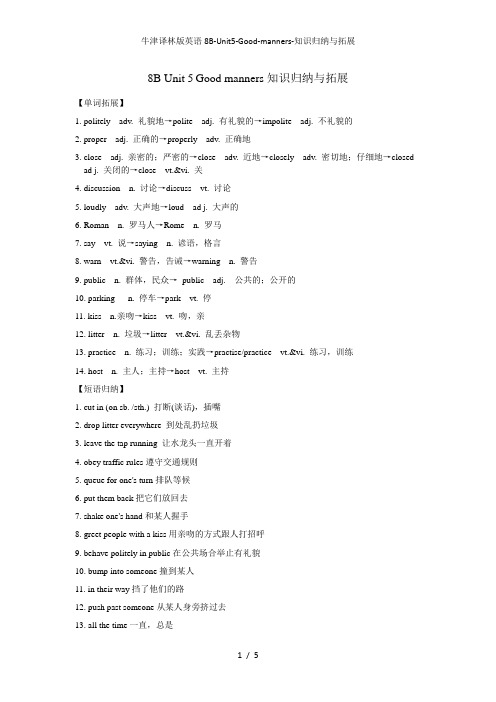
8B Unit 5Good manners知识归纳与拓展【单词拓展】1. politely adv. 礼貌地→polite adj. 有礼貌的→impolite adj. 不礼貌的2. proper adj. 正确的→properly adv. 正确地3. close adj. 亲密的;严密的→close adv. 近地→closely adv. 密切地;仔细地→closed ad j. 关闭的→close vt.&vi. 关4. discussion n. 讨论→discuss vt. 讨论5. loudly adv. 大声地→loud ad j. 大声的6. Roman n. 罗马人→Rome n. 罗马7. say vt. 说→saying n. 谚语,格言8. warn vt.&vi. 警告,告诫→warning n. 警告9. public n. 群体,民众→public adj. 公共的;公开的10. parking n. 停车→park vt. 停11. kiss n.亲吻→kiss vt. 吻,亲12. litter n. 垃圾→litter vt.&vi. 乱丢杂物13. practice n. 练习;训练;实践→practise/practice vt.&vi. 练习,训练14. host n. 主人;主持→host vt. 主持【短语归纳】1. cut in (on sb. /sth.) 打断(谈话),插嘴2. drop litter everywhere 到处乱扔垃圾3. leave the tap running 让水龙头一直开着4. obey traffic rules遵守交通规则5. queue for one's turn排队等候6. put them back把它们放回去7. shake one's hand和某人握手8. greet people with a kiss用亲吻的方式跟人打招呼9. behave politely in public在公共场合举止有礼貌10. bump into someone撞到某人11. in their way挡了他们的路12. push past someone从某人身旁挤过去13. all the time一直,总是14. be helpful to us对我们有帮助15. by accident偶然,意外地16. avoid talking about age避免谈论年龄17. keep us safe from danger保护我们免除危险18. make his dream come true实现他的梦想19. hold a talk on good table manners举办一个关于良好的餐桌礼仪的讲座20. above all首先,首要的是21. keep one’s voice down压低声音22. warn sb. not to do sth.警告某人不要做某事23. express oneself clearly清楚表达自己的意见【句型分析】1. I hope so. ( P67 )原句意为:我希望如此。
牛津译林版八年级英语下册8BUnit5 Good manners 教案(表格式)
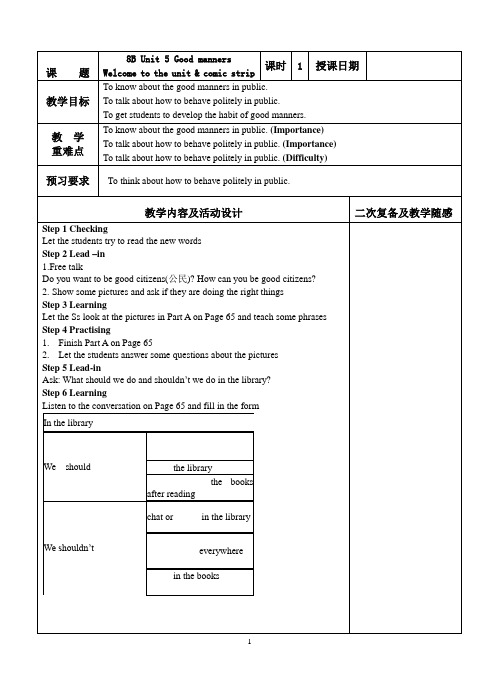
课题8B Unit 5 Good mannersWelcome to the unit & comic strip课时 1 授课日期教学目标To know about the good manners in public.To talk about how to behave politely in public.To get students to develop the habit of good manners.教学重难点To know about the good manners in public. (Importance) To talk about how to behave politely in public. (Importance) To talk about how to behave politely in public. (Difficulty)预习要求To think about how to behave politely in public.教学内容及活动设计二次复备及教学随感Step 1 CheckingLet the students try to read the new wordsStep 2 Lead –in1.Free talkDo you want to be good citizens(公民)? How can you be good citizens?2. Show some pictures and ask if they are doing the right thingsStep 3 LearningLet the Ss look at the pictures in Part A on Page 65 and teach some phrasesStep 4 Practising1.Finish Part A on Page 652.Let the students answer some questions about the picturesStep 5 Lead-inAsk: What should we do and shouldn’t we do in the library?Step 6 LearningListen to the conversation on Page 65 and fill in the formIn the libraryWe should ______ ___________ the library ______ _____ _____ the books after readingWe shouldn’t chat or _____ in the library _____ _____ everywhere _____ in the booksStep 7 PracticeDiscussion:What should we do in a public place? We should….What shouldn’t we do in a public place?We shouldn’t….Step 8 Lead-inAsk: Do you think Hobo will share his things with others? What about Eddie? Step 9 Learning1.Read and answer the following questions.(1). Do you think Eddie really wants to teach Hobo?(2). What does Eddie teach Hobo?(3). What does Eddie really want from Hobo?nguage pointsStep 10 PracticeRead the conversation aloudStep 11 TestingTranslate some phrasesStep 12 Homework1.记忆词汇、词组和句型。
牛津译林版八年级英语下册Unit 5 Good manners 重难点知识归纳总结
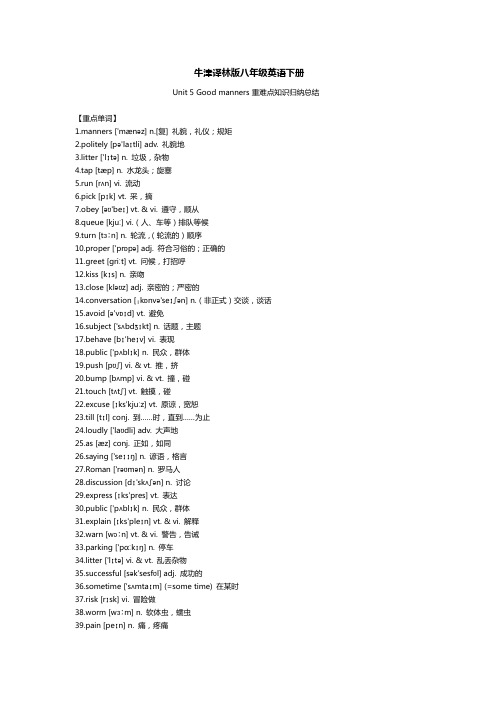
牛津译林版八年级英语下册Unit 5 Good manners 重难点知识归纳总结【重点单词】1.manners ['mænəz] n.[复] 礼貌,礼仪;规矩2.politely [pə'laɪtli] adv. 礼貌地3.litter ['lɪtə] n. 垃圾,杂物4.tap [tæp] n. 水龙头;旋塞5.run [rʌn] vi. 流动6.pick [pɪk] vt. 采,摘7.obey [əʊ'beɪ] vt. & vi. 遵守,顺从8.queue [kjuː] vi.(人、车等)排队等候9.turn [tɜːn] n. 轮流,(轮流的)顺序10.proper ['prɒpə] adj. 符合习俗的;正确的11.greet [griːt] vt. 问候,打招呼12.kiss [kɪs] n. 亲吻13.close [kləʊz] adj. 亲密的;严密的14.conversation [ˌkɒnvə'seɪʃən] n.(非正式)交谈,谈话15.avoid [ə'vɒɪd] vt. 避免16.subject ['sʌbdʒɪkt] n. 话题,主题17.behave [bɪ'heɪv] vi. 表现18.public ['pʌblɪk] n. 民众,群体19.push [pʊʃ] vi. & vt. 推,挤20.bump [bʌmp] vi. & vt. 撞,碰21.touch [tʌtʃ] vt. 触摸,碰22.excuse [ɪks'kjuːz] vt. 原谅,宽恕23.till [tɪl] conj. 到……时,直到……为止24.loudly ['laʊdli] adv. 大声地25.as [æz] conj. 正如,如同26.saying ['seɪɪŋ] n. 谚语,格言27.Roman ['rəʊmən] n. 罗马人28.discussion [dɪ'skʌʃən] n. 讨论29.express [ɪks'pres] vt. 表达30.public ['pʌblɪk] n. 民众,群体31.explain [ɪks'pleɪn] vt. & vi. 解释32.warn [wɔːn] vt. & vi. 警告,告诫33.parking ['pɑːkɪŋ] n. 停车34.litter ['lɪtə] vi. & vt. 乱丢杂物35.successful [sək'sesfʊl] adj. 成功的36.sometime ['sʌmtaɪm] (=some time) 在某时37.risk [rɪsk] vi. 冒险做38.worm [wɜːm] n. 软体虫,蠕虫39.pain [peɪn] n. 痛,疼痛40.gain [ɡeɪn] n. 收获41.indeed [ɪn'diːd] adv. 真正地42.practice ['præktɪs] n. 练习;训练;实践43.candle ['kændl] n. 蜡烛44.purpose ['pɜːpəs] n. 目的45.content [kən'tent] n. 内容;目录46.conclusion [kən'kluːʒ(ə)n] n. 总结,归纳47.guest [ɡest] n. 客人,宾客48.host [həʊst] n. 主人,主持49.impolite [ˌɪmpə'laɪt] adj. 不礼貌的【重点短语】1. cut in on sb./sth. 打断某人/某事2. drop litter 乱扔垃圾3. keep quiet 保持安静4. obey traffic rules 遵守交通规则5. pick flowers 摘花6. queue for one’s turn 排队等候轮到某人7. keep the library clean 保持图书馆的清洁8. put...back 把……放回原处9. the proper way to ……的正确方法10. shake one’s hand 同某人握手11. start a conversation 开始谈话12. in public 在公共场合13. push in 插队14. bump into someone 撞到某人15. in one’s way 挡住某人的路16. excuse me 劳驾17. as well 也,还有18. keep your voice down 压低你的声音19. by accident/by chance 偶然,意外地20. make everyone laugh 让每个人笑21. on one’s own独自22. join the discussion 加入讨论23. express himself clearly 清楚地表达他自己24. all the main points所有的要点25. be busy with sth. 忙于某事26. keep sb. from sth. 阻止某人做某事27. warn sb. (not ) to do sth. 警告某人不要做某事28. take a photo of 给……拍照29. soon after 不久之后30. at one time 同时,一次31. make too much noise制造太多的噪音32. reach over someone’s plate for sth. 越过别人的盘子去够东西33. purpose of the talk谈话的目的34. take place 发生35. above all 首要的是【重点句型】1. You’re old enough to learn about manners now, Hobo.霍波,你现在长大了,可以学习礼仪了。
牛津译林版英语八年下册 Unit 5 Good manners 课文要点解析
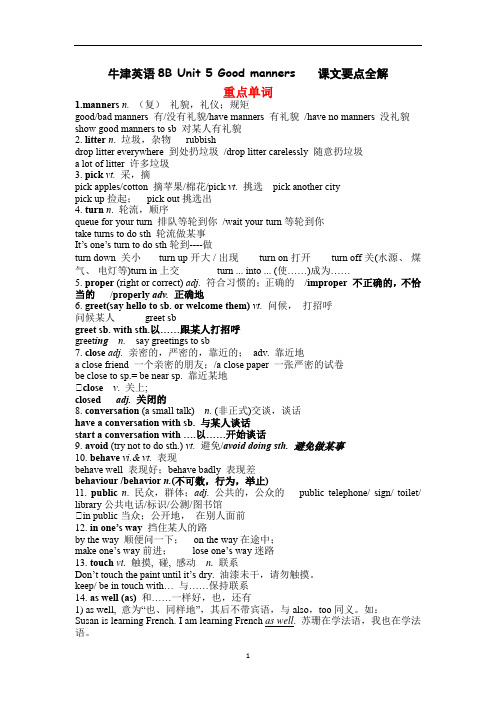
牛津英语8B Unit 5 Good manners 课文要点全解重点单词1.manners n.(复)礼貌,礼仪;规矩good/bad manners 有/没有礼貌/have manners 有礼貌/have no manners 没礼貌show good manners to sb 对某人有礼貌2. litter n. 垃圾,杂物rubbishdrop litter everywhere 到处扔垃圾/drop litter carelessly 随意扔垃圾a lot of litter 许多垃圾3. pick vt.采,摘pick apples/cotton 摘苹果/棉花/pick vt. 挑选pick another citypick up捡起;pick out挑选出4. turn n. 轮流,顺序queue for your turn 排队等轮到你/wait your turn等轮到你take turns to do sth 轮流做某事It’s one’s turn to do sth轮到----做turn down关小turn up开大/出现turn on打开turn off关(水源、煤气、电灯等)turn in上交turn...into...(使……)成为……5. proper (right or correct) adj.符合习惯的;正确的/improper 不正确的,不恰当的/properly adv. 正确地6. greet(say hello to sb. or welcome them) vt. 问候,打招呼问候某人greet sbgreet sb. with sth.以……跟某人打招呼greet ing n.say greetings to sb7. close adj.亲密的,严密的,靠近的;adv. 靠近地a close friend 一个亲密的朋友;/a close paper 一张严密的试卷be close to sp.= be near sp. 靠近某地★close v. 关上;closed adj.关闭的8. conversation (a small talk) n. (非正式)交谈,谈话have a conversation with sb. 与某人谈话start a conversation with ….以……开始谈话9. avoid (try not to do sth.) vt.避免/avoid doing sth. 避免做某事10. behave vi.& vt.表现behave well 表现好;behave badly 表现差behaviour /behavior n.(不可数,行为,举止)11. public n. 民众,群体;adj. 公共的,公众的public telephone/ sign/ toilet/ library公共电话/标识/公测/图书馆★in public当众;公开地,在别人面前12. in one’s way挡住某人的路by the way 顺便问一下;on the way在途中;make one’s way前进;lose one’s way迷路13. touch vt.触摸, 碰, 感动n. 联系Don’t touch the paint until it’s dry. 油漆未干,请勿触摸。
牛津译林版英语八年级下册Unit5 Good manners词汇 知识点讲解
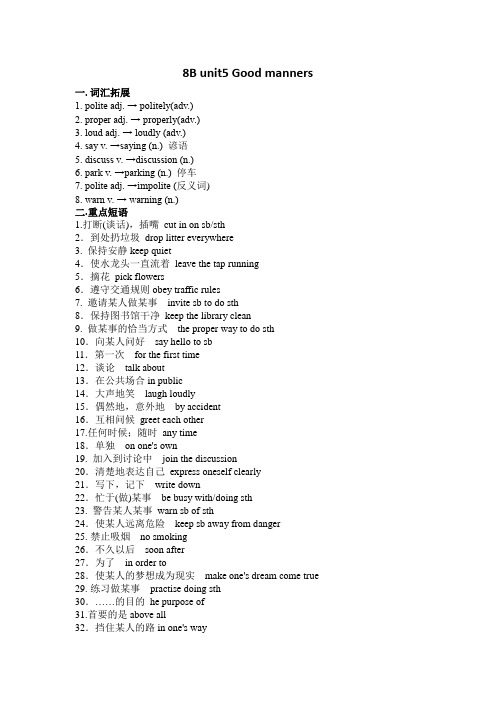
8B unit5 Good manners一.词汇拓展1. polite adj. → politely(adv.)2. proper adj. → properly(adv.)3. loud adj. → loudly (adv.)4. say v. →saying (n.) 谚语5. discuss v. →discussion (n.)6. park v. →parking (n.) 停车7. polite adj. →impolite (反义词)8. warn v. → warning (n.)二.重点短语1.打断(谈话),插嘴cut in on sb/sth2.到处扔垃圾drop litter everywhere3. 保持安静keep quiet4.使水龙头一直流着leave the tap running5.摘花pick flowers6.遵守交通规则obey traffic rules7. 邀请某人做某事invite sb to do sth8.保持图书馆干净keep the library clean9. 做某事的恰当方式the proper way to do sth10.向某人问好say hello to sb11.第一次for the first time12.谈论talk about13.在公共场合in public14.大声地笑laugh loudly15.偶然地,意外地by accident16.互相问候greet each other17.任何时候;随时any time18.单独on one's own19. 加入到讨论中join the discussion20.清楚地表达自己express oneself clearly21.写下,记下write down22.忙于(做)某事be busy with/doing sth23. 警告某人某事warn sb of sth24.使某人远离危险keep sb away from danger25.禁止吸烟no smoking26.不久以后soon after27.为了in order to28.使某人的梦想成为现实make one's dream come true 29.练习做某事practise doing sth30.……的目的he purpose of31.首要的是above all32.挡住某人的路in one's way三.重点句子1.霍波,你现在够大了,要学习有关礼仪的东西了。
译林8BUnit5GOODMANNERS教案

备课 日期 2014 年 教学 课题Unit 5 Good manners 课时安排1 4月 15日Comic strip & Welcome to the unit7 教 学 目 标1. 了解各种礼仪知识了解各种礼仪知识2. 用英语谈论如何在公共场所举止得体用英语谈论如何在公共场所举止得体3.培养学生良好的学习习惯培养学生良好的学习习惯重点 1.了解各种礼仪知识了解各种礼仪知识2.用英语谈论如何在公共场所举止得体用英语谈论如何在公共场所举止得体3.用英语谈论如何在公共场所举止得体用英语谈论如何在公共场所举止得体难点 教学过程设计集 体 备 课二 次 备 课Step1 Lead-in Look Look at at at the the the pictures.Are pictures.Are pictures.Are people people people doing doing doing the the the right right right things things things or or or wrong wrong things? They discuss in pairs. Step2 Presentation 1. Answering the following questions: What should the boy do when he cross the road? What is the girl doing? What should we do in the library? What are the man and the woman doing? What is the man doing? What did the boy do? 2. Discussing Who is doing right and whi is doing wrong? 3. Finish Part A. Show the 6 pictures (1) What should the boy do when he cross the road? (He should obey the traffic rules.) (2) What is the girl doing? (She is picking the flowers in the park.) (3) What should we do in the library? (We should keep quiet in the library.) (4) What are the man and the woman doing? (They are dropping litter everywhere .) (5)What is the man doing? (He is queuing for his turn.) Learn the new phrases: 1.drop litter everywhere 2. leave the tap running 3.obey traffic rules 4. queue for your turn 5. old enough to do 6. too … to …7.share …with …8. I ’m afraid not (6)What did the boy do? (He left the tap running. ) Who Who’’s doing right and who’who’s doing wrong? Why? s doing wrong? Why? Step2 Comic strip 1.Asking 1.Asking the the the question:Do question:Do you you think think think Hobo Hobo Hobo will will will share share share things things things with with others? What about Eddi? 2. After listening,answer the questions: DO you think Eddie really want to teach Hobo? What does Eddie teach Hobo? What does Eddie really want from Hobo? 4. Organize the whole class to read. Step3 Practise Read loudly Encourage them to act out the dialogue. Step 3 Practice The The Class Class Class 11,Grade Grade 8 8 8 students students students are are are discussing discussing discussing the the the right right right and and and wrong wrong things to do in public places .Look at the pictures in Part A and match them with the phrases .Check the answers. Say something about the pictures. Step 4. Presentation 1Repeat after the tape (Dialogue of Part B) 2设计几个场景,如:马路、公园、教室、电影院、卫生间等,让学生两人一组,模仿B 部分新编对话。
译林版牛津英语八年级下册-8B-Unit5-Good-manners-复习课件

Good manners in Britain
A: Watch a video and tell what you have learnt.
William Hansen, The master of good manners in Britain
keep quiet in the library queue for your turn
Choose the right things to do in public places
keep quiet in the library leave the tap running obey traffic rules queue for our turn drop litter everywhere pick flowers in the park
B: Read the text on page 66-67 and complete the form.
Topic
G2re__e_tings
M1an_n_e_r_s___ in the UK
British people usually say “hello” or “nice to meet you” and
1. turn (v.) 转,旋转;使变换,使变为 (n.)轮流,顺序 打开_tu_r_n__o_n__ 关闭 _t_u_r_n_o_f_f_ 音量调高/低__tu__r_n_u_p_/down 转身_t_u_r_n__a_r_ound转向某人_t_u_r_n__to__sb 结果是_t_u_r_n__o_u_t 把...变成_tu_r_n__i_n_to_ 轮到某人做某事_I_t_'s_o__n_e_'s__tu_r_n__t_o_d__o_s_t_h 轮流做某事__ta_k__e_t_u_r_n_s_t_o__d_o_s_t_h______ Exercises:
- 1、下载文档前请自行甄别文档内容的完整性,平台不提供额外的编辑、内容补充、找答案等附加服务。
- 2、"仅部分预览"的文档,不可在线预览部分如存在完整性等问题,可反馈申请退款(可完整预览的文档不适用该条件!)。
- 3、如文档侵犯您的权益,请联系客服反馈,我们会尽快为您处理(人工客服工作时间:9:00-18:30)。
8B Unit 5Good manners知识归纳与拓展【单词拓展】1. politely adv. 礼貌地→polite adj. 有礼貌的→impolite adj. 不礼貌的2. proper adj. 正确的→properly adv. 正确地3. close adj. 亲密的;严密的→close adv. 近地→closely adv. 密切地;仔细地→closed ad j. 关闭的→close vt.&vi. 关4. discussion n. 讨论→discuss vt. 讨论5. loudly adv. 大声地→loud ad j. 大声的6. Roman n. 罗马人→Rome n. 罗马7. say vt. 说→saying n. 谚语,格言8. warn vt.&vi. 警告,告诫→warning n. 警告9. public n. 群体,民众→public adj. 公共的;公开的10. parking n. 停车→park vt. 停11. kiss n.亲吻→kiss vt. 吻,亲12. litter n. 垃圾→litter vt.&vi. 乱丢杂物13. practice n. 练习;训练;实践→practise/practice vt.&vi. 练习,训练14. host n. 主人;主持→host vt. 主持【短语归纳】1. cut in (on sb. /sth.) 打断(谈话),插嘴2. drop litter everywhere 到处乱扔垃圾3. leave the tap running 让水龙头一直开着4. obey traffic rules遵守交通规则5. queue for one's turn排队等候6. put them back把它们放回去7. shake one's hand和某人握手8. greet people with a kiss用亲吻的方式跟人打招呼9. behave politely in public在公共场合举止有礼貌10. bump into someone撞到某人11. in their way挡了他们的路12. push past someone从某人身旁挤过去13. all the time一直,总是14. be helpful to us对我们有帮助15. by accident偶然,意外地16. avoid talking about age避免谈论年龄17. keep us safe from danger保护我们免除危险18. make his dream come true实现他的梦想19. hold a talk on good table manners举办一个关于良好的餐桌礼仪的讲座20. above all首先,首要的是21. keep one’s voice down压低声音22. warn sb. not to do sth.警告某人不要做某事23. express oneself clearly清楚表达自己的意见【句型分析】1. I hope so. ( P67 )原句意为:我希望如此。
在英语中,某些表示想法的动词或结构后,可以接替代词so(用于肯定)和not(用于否定),用以代替前面提到的内容。
这类动词和结构主要有:think,believe,hope,suppose,guess,imagine,expect,be afraid等。
如:(1) 一Will he come to the party?他来参加晚会吗?一I hope so.我希望他来。
一I hope not.我希望他不来。
一I don't hope so.(误)(2) 一Can you finish it in time?你能及时完成吗?一I'm afraid so.恐怕可以吧。
一I'm afraid not.恐怕不行。
(3)一Is that Mary?那是玛丽吗?一Yes. I think so.我想是的吧。
I don’t think so.我想不是吧。
(4)一Will he be late again?他会又迟到吗?一I believe so.我相信会是如此。
I believe not.我相信不会吧。
2 . W by not? ( P73 )原句意为:为什么不要?why not意为“为什么不”,其后跟动词原形,这个句型还可以变成:Why don't you do sth.?表示“劝说、建议某人去做某事”。
如:Your spoken English is poor. Why not join an English club?你的英语口语很差。
为什么不参加一个英语俱乐部呢?Why not come early?=Why don't you come early?你为什么不早点来?常见的征求建议的句型还有:What/How about+名/词代词/v. -ing?……怎么样?如:What/How about going for a walk?去散步好吗?Shall we do...?我们做……好吗?如:Shall we play football?我们去踢足球好吗?Let's do…让我们做……吧。
如:Let's have a rest.让我们休息一会儿吧。
Would you like ( to do)...?你想(做)……吗?如:Would you like some bread?你想要些面包吗?3. These rules are important because we should make sure that both guests and hosts are comfortable at the table. (P77)原句意为:这些规则很重要,因为我们应该确保坐在桌子边的客人和主人都轻松自在。
句中的make sure意为“弄清楚;务必;确信”,其后多接that引导的宾语从句,有时也与of/about连用。
如:I make sure that I have turned the tap off.我确信我已关上了水龙头。
Please make sure of the time and place.请弄清楚时间和地点。
be sure of/that...意为“对……有把握;确信”,主语常是人。
如:He is sure of succes.=He is sure that he will succeed.他确信他会成功。
be sure to do sth.意为“一定,必然会”,主语可以是人,也可以是物,表示说话人的推测。
如:He's sure to win.他一定会赢。
It is sure to rain.天准会下雨。
另外,注意at table与at the table的区别。
at table意为“在吃饭”,其结构为:at+名词,表示状态。
如:Don't speak loudly when you are at table.在吃饭时,不要大声说话。
They were at table when we dropped in.我们去拜访时他们正在吃饭。
at the/a table意为“在桌子旁”,不一定在吃饭。
如:They were sitting at the table, talking about something they were interested in.他们正坐在桌边谈论他们感兴趣的事情。
【语法点拨】enough to的用法“be+adj./adv.+enough to do sth.”结构常用来描述一个人的个性、品格和能力。
该结构可以用so... that句型进行替换。
如:He is strong enough to carry the heavy stone.=He is so strong that he can carry the heavy stone.他够强壮能搬起这块很重的石头。
enough在句中可以作状语、定语和表语。
如:The house is not big enough for us.这房子对我们来说不够大。
(作状语)Have you got enough money?你的钱够吗?(作定语)Six bottles should be enough.六瓶应该够了。
(作表语)too... to的用法英语中too... to结构的基本形式是“be too+adj./adv.(for sb.)+to do sth.”,意为“(对某人来说)太……而不能……”,它在形式上是肯定的,但在意义上是否定的。
使用该结构时,应注意以下几点:1. 当主语本身是动词不定式的逻辑宾语时,不定式后不接宾语。
此时的不定式如果是不及物动词,动词之后应加上适当的介词,这时的主语就变成了介词的宾语。
如:The water in the glass is too hot to drink.杯子内的水太热了不能喝。
( drink是及物动词,the water是drink的逻辑宾语)The house is too old to live in.这房子太旧了不能住( live是不及物动词,其后须接介词,the house是in的逻辑宾语)2.当主语不是不定式的逻辑宾语,而不定式是及物动词时,动词之后要接宾语。
如:The hall is too small to hold so many students.会堂太小了不能容纳这么多学生。
3. 动词不定式之前可以带逻辑主语,表示不定式动作的执行者,常用for sb.。
如:The house is too expensive for him to buy.对他来说这房子太贵了,买不起。
4. 如果在too之前加上not或never,该结构就不再有否定的意义,意为“永/绝不……做某事”。
如:Chinese is not too difficult to learn.汉语绝不难学。
One is never too old to learn.活到老,学到老。
